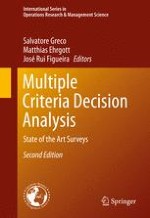2016 | OriginalPaper | Buchkapitel
27. Multiple Criteria Decision Analysis and Sustainable Development
verfasst von : Giuseppe Munda
Erschienen in: Multiple Criteria Decision Analysis
Verlag: Springer New York
Aktivieren Sie unsere intelligente Suche, um passende Fachinhalte oder Patente zu finden.
Wählen Sie Textabschnitte aus um mit Künstlicher Intelligenz passenden Patente zu finden. powered by
Markieren Sie Textabschnitte, um KI-gestützt weitere passende Inhalte zu finden. powered by
